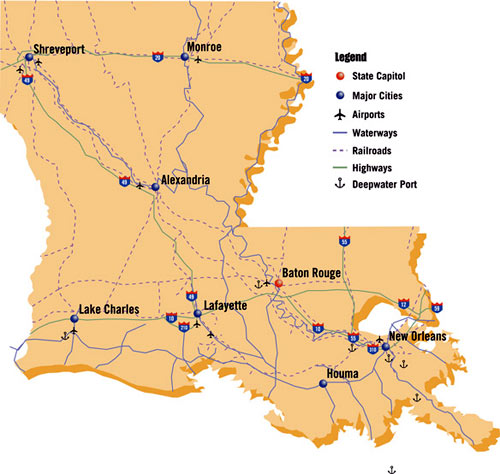
JANUARY 2005
Louisiana: Why Industry Is Moving Back to the Bayou State
Sir, the Governor's
on the Phone
First Among Equals
Education-Industry Partnership
Port Gets Retooling for 21st Century Commerce (sidebar)
Bringing the
Students Home
Blanco: Ethics
Is Job One
Shreveport's Aerospace Industry Gains Altitude (sidebar)
GM Plant Hums Along
How Louisiana
Beat Ohio
Education Inroads
Foundation Gives Biotech a Boost
Enhanced State Economic Development Portal to Debut (sidebar)
Industry Clusters
Gain Traction
Transport Complex Would Reclaim Louisiana's 'Gateway to Latin America' Status (sidebar)
Container-on-Barge
Is Key
Energy Industry
in Transition
Request Information

Education Inroads
A newcomer to the same area is the new campus of Bossier Parish Community College (BPCC) in Bossier City. Classes began at the new campus in January 2005. The college has 4,400 students enrolled in a wide range of degree programs, from industrial technology to computer information systems to medical disciplines. The new, 71-acre (29-hectare) campus will enable the college to double the number of students supplying local employers by 2010. BPCC is a leading recipient of the state's Incumbent Worker Training Program with 16 grants in place and others in the approval process.
Elsewhere on the higher education front, a consortium of Louisiana's colleges and universities is in the midst of a major networking project. When complete, the Louisiana Optical Network Initiative (LONI) will significantly elevate the schools' research capabilities and increase the visibility of research under way. LONI is as much an economic development tool as it is a statewide, state-of-the-art optical network, according to Louisiana Higher Education Board of Regents member Mike Abbiatti, who serves as Associate Commissioner for Information and Learning Technology.
 |
"What sets us apart from so many other entities involved in optical networking in this arena is that this is an economic development initiative for us — we're saying that right up front," he says. "It's also a change agent. The idea of optical networking and grid computing in the State of Louisiana for the research community and the corporate community makes all the sense in the world to us, and we think it will to industries large and small that might want to come to or expand in Louisiana."
In essence, LONI will take three already-existing components — high-speed networks, distributed parallel processing and brainpower — and connect them, producing speed and capacity for use by the state's eight research institutions. Slated to link to LONI are the University of Louisiana at Lafayette, Louisiana Tech University, Southern University, Tulane University, University of New Orleans, Louisiana State University (LSU) at Baton Rouge and LSU Medical Centers at New Orleans and Shreveport.
"The economic development comes in with the research applications we apply to LONI," Abbiatti explains. The network can aid research under way today, but it also will empower the state and region's research community in the future to create new applications. "To view research as an economic development tool is new for our economic developers and for most people outside higher education. No one ever sees what a researcher does until the endpoint." LONI will help get the word out earlier on, which will help attract the attention of potential investors and others in the research commercialization process.
"On the corporate side, we want very much for our corporate community to see the infrastructure, to see the intellectual capital we have available and then to contract with that intellectual capital to derive economic benefit," says Abbiatti. "That will float the entire boat, if you will."
Implementation of "Louisiana: Vision 2020" recommendations (a blueprint document for achieving statewide prosperity by 2020) and a previous governor's information-technology initiative that provided seed funding to create centers of excellence at colleges around the state are the genesis of LONI.
"Now, we are providing those centers of excellence with the high-speed and grid-computing infrastructure they need to do their jobs," says Abbiatti.
Abbiatti acknowledges that Louisiana lacks an M.I.T.-class research university, but by pooling the resources of the eight participating institutions, the playing field is leveled. LONI is the technical infrastructure that makes that possible.
The consortium's use of LONI will be fascinating to watch, because historically, research has been a closely guarded academic endeavor with competitive-edge considerations at play. Abbiatti, a nationally recognized expert in the application of technology in higher education, is confident the members will thrive with the new networking environment, because they all will benefit locally, regionally and nationally from the greater exposure their research will gain.
In September 2004, Gov. Blanco put her support behind the initiative with a $40 million commitment over the next 10 years to help fund it.
"LONI will put Louisiana on the cutting edge of modern research, and it will prepare us for future academic challenges and the demands of the knowledge economy," she noted at the time.
Mike Abbiatti was instrumental in getting the National Lambda Rail, a national network infrastructure for research universities and private-sector companies, to include a network node in Baton Rouge. This node will make LONI a reality and the state of Louisiana a player on the national technical research stage.